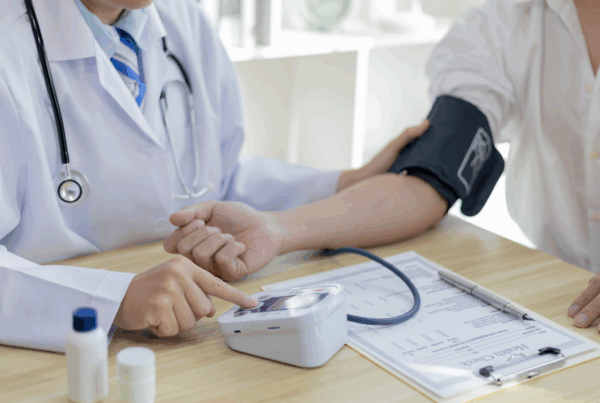Despite The Lowest Consumption Of Fat And Dietary Cholesterol In Human History, Rates Of Heart Disease Are Continuing To Skyrocket.
Nearly one million people a year die in the United States from heart attack. That’s 1/3 of all deaths.
The Good News Is, There Are Several Things You Can Do Right Now To Prevent Heart Disease!
In this blog, I’m going to give you the seven most important things that you need to be doing to minimize your risk for heart disease, and the conversations that you need to be having with your doctor to make sure you’re at the lowest risk possible.
Heart disease is an umbrella term that encompasses heart attack, stroke and hypertension, or high blood pressure.
In a normal situation, a nice slick blood vessel supplies the heart with oxygen rich blood. When you have heart disease, trauma causes a weak spot in the lining of the blood vessel to form. This weak spot makes the blood vessel vulnerable for things that are normally in the blood to deposit in it’s wall, such as cholesterol.
It Starts With An Injury To The Lining Of Your Blood Vessels.
Notice, I didn’t say cholesterol causes the heart attack, because cholesterol is only involved in this story because there was an injury to the blood vessel to begin with.
If there’s no injury to the blood vessel, you can never start the cascade of events that lead to having a heart attack.
Once cholesterol starts to migrate into the wall of the blood vessel and begins to collect, a plaque begins to form. The plaque hardens, grows larger, and becomes unstable.
Cholesterol Then Makes A Plaque.
The plaque can become so unstable that fragments of it break off and can get wedged into a smaller blood vessel. This blocks arteries, or blood vessels, and blood flow. If there is no blood flow, that tissue dies.
When heart tissue dies, it causes chest pain and a heart attack.
Unlike other cells in our body, brain and heart cells, do not regenerate. Once they’re deprived of oxygen and die, they’re gone.
If a heart attack is big enough, and enough heart tissue dies, it can result in sudden death.
Plaques Rupture. Blood Flow Stops. And Tissue Dies.
Here are are the most important things that you can do right now to reduce your risk of having a heart attack.
1) Increase your activity level.
Human beings are designed to be in motion, pushing and pulling against things, and meeting resistance.
When we don’t engage in our environment in an active fashion, there are a long sequence of negative consequences. So find ways to increase your physical activity.
2) Reduce excess body fat.
Our bodies are designed to be in motion, not overweight or obese. Extra weight puts excess wear and tear on our joints, and causes metabolic consequences like insulin resistance and metabolic syndrome.
80% of chronic diseases are directly linked to insulin resistance and metabolic syndrome.
The holy grail of fat loss is stabilization of your blood sugar which limits excess insulin, so that you are free to burn fat.
3) Improve your cholesterol numbers.
To reduce heart attack plaque formation, you need to focus three things related to your cholesterol:
Reducing triglycerides.
Raising HDL.
Reducing small-dense LDL.
4) Lower your blood pressure.
Blood pressure above 130/85 is a risk factor for heart attack.
High blood pressure pushing against your blood vessels causes injury, making it vulnerable for cholesterol to deposit in them.
It can also be the metabolic “flick” that causes a plaque to rupture, leading to a heart attack.
5) Improve your diet.
If your current diet does not take captive every carbohydrate you put in your mouth, you’re going to have a hard time winning at this.
The ideal diet is low in carbohydrates, high in fat, and moderate in protein.
6) Quit smoking.
The number one preventable risk factor for heart attack is smoking.
While 90% of smokers never get lung cancer, 100% of smokers suffer from heart attack or stroke.
No exception.
The toxins from cigarette smoke enter your bloodstream and irritate the lining of your blood vessels. This irritation weakens the blood vessel and causes injury. It also creates a weak spot for cholesterol to deposit, causing plaque build up in your artery walls.
If you’re a smoker, you’ve got to quit.
And if you don’t smoke, the best thing you can ever do is to never start smoking.
7) Normalize your blood sugar.
No disease will outpace diabetes worldwide in the next 20 years.
It is the number one health concern in the world.
The American College of Cardiology states that having diabetes and having heart disease are one-in-the same. In other words, it’s a risk equivalent. You have just as much risk if you have known heart disease of having another heart attack, as you do if you don’t have heart disease but just have diabetes.
This is huge. This is why all diabetics end up with heart disease. All of them.
Here Are The Conversations That You Need To Have With Your Doctor About Heart Disease.
1) How do I control my blood sugar?
Normalizing your blood sugar is the primary objective to risk reduce for heart attack.
Overeating things that raise your blood sugar puts you on the path to insulin resistance, metabolic syndrome, and diabetes.
When your blood sugar and insulin are high, it causes trauma and injury to the lining of your blood vessels and, over time, plaques form and rupture causing a heart attack. We know that to be true. You’ve got to fix your diet.
I recommend a carb controlled diet that is high in fat and moderate in protein.
A diet that’s optimal for health consists of vegetables, protein, and high fat foods like fish, nuts, oils, that are very filling and very satisfying.
This type of diet stabilizes your blood sugar, helps with weight loss, and helps improve your cholesterol numbers.
In addition to diet, a medication called Metformin can help improve your blood sugar and reverse insulin resistance. Metformin is very safe and causes very few low blood sugar episodes.
I am a huge advocate of adding Metformin or increasing the dose to the max dose, which is 2500 mg a day.
2) How Can I Stop Smoking?
If you’re a smoker, telling you to quit smoking is like telling a golfer to quit golfing or a baker to quit baking.
You just don’t hate it, and it’s very hard to walk away from something that you actually like.
Medication can help you reduce the craving of nicotine, but it doesn’t help you like smoking less.
You’ve got to get to a place where it is an absolute must to quit smoking. You’ve actually got to learn to hate it.
Most people who smoke have subconscious patterns that trigger the urge to smoke. Things like playing cards, watching movies, drinking beer, or hanging out with certain people.
You might need to get new hobbies, or new friends, but you’ve got to eliminate triggers in order to quit smoking for good.
I just encourage you to never, ever, ever, ever give up. If you’re still on this planet and you’re still alive, you owe it to yourself to never give up.
The greatest thing that you could ever quit is smoking.
If you’re at risk for heart disease and heart attack, please talk to your doctor about ways you can decrease your risk for developing them.
As always, thank you for reading our blog.
Please leave me your me your comments, questions, and let me know if there are other topics you would like me to discuss in future posts.
If you prefer video content, please be sure to subscribe to our YouTube channel. You can also listen to our podcast The Concierge Medicine Show on iTunes.
Take care —
Aaron Wenzel, MD

Dr. Aaron Wenzel is a concierge physician specializing in the care of fast-moving entrepreneurs, executives, and public figures in the Nashville, TN area. Dr. Wenzel’s diverse life experience and extensive training in family medicine, emergency care, nutrition, and hormone replacement therapies give him the unique platform to provide unmatched care for his patients.




